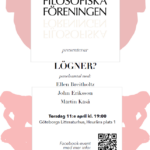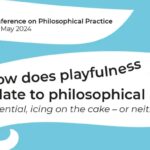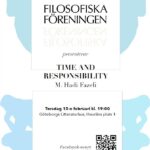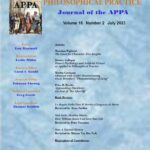… till coachning och counselingkunder:

”Under många år led jag av … jag vet inte vad jag ska kalla det. Psykisk ohälsa, kanske. Jag var instabil. Kunde ofta reagera starkt. Mycket starkare än många andra, märkte jag. Intensiv har jag alltid varit. Intensiteten spelade in, men det var något annat också. Minsta lilla grej kunde förstöra en hel dag – det tog lång tid för mig att komma tillbaka i balans. Skuld och skam funderade jag mycket på också. Mitt ’self-talk’ handlade ofta om min skuld och min skam, och hur jag kämpade med de känslorna.
I början av 2000-talet bodde jag på Nya Zeeland. En gång hade de en statlig informationskampanj om mental health; affischer längs vägarna och korta filmer under reklampausen på TV. En av fyra drabbas, stod det. One in four. Människorna på bilderna såg liksom tillslutna ut – tillsammans med andra men ändå ensamma …
25 % är många, tänkte jag.
Och jag kände att jag var en av dem.
Jag studerade filosofi på universitetet och fick KBT, kognitiv beteende-terapi, via studenthälsan. Terapeuten var fantastisk. Lesley hette hon. Jag lärde mig mycket.
Något år senare dog min pappa, efter en lång tids sjukdom. Jag flyttade från Nya Zeeland till Holland – hans land – för att läsa mer filosofi. Det var en svår tid. Jag led av sorg och allmänt patos, och snart mådde jag riktigt dåligt. Började gå hos en ny terapeut. Psykodynamisk snarare än KBT denna gång. Jag hade tendenser åt borderline; emotionell instabilitet. Ingen diagnos, men tendenser.
Terapeuten hette Mrs. S. Hos henne gick jag ett år. Jag pluggade samtidigt, fick bra betyg. Sedan flyttade jag tillbaka till Sverige.
Efter några år fick jag mitt första barn. När hon var liten började jag plötsligt bli rädd för sjukdomar – inte för hennes del, utan för min egen. Det var mycket obehagligt, och jag ville inte att min lilla dotter skulle påverkas av hur jag mådde … Jag sökte hjälp via Vårdcentralen, och fick träffa en psykolog, Nasrin. Hos henne gick jag av och till i flera år. Underbara Nasrin.
Samtidigt jobbade jag på som vanligt – det märktes nog inte särskilt
mycket på utsidan. Men visst gömde jag mig och grät i badrummet på
kontoret under svåra dagar.
Så under vintern 2012-13 hände
något. Jag fick ångesternas ångest och samtidigt influensa. Mitt under
febertopparna skrev jag i min dagbok. Jag skrev och skrev, namngav,
definierade, avgränsade, filosoferade som jag övat så länge och gjort
till en vana – denna gång om mina egna känslor och upplevelser.
När jag kom ut på andra sidan, så att säga, visste jag att något hade släppt. Sedan dess har jag inte varit rädd för nästa ångestattack. Och de tillfällen när tendenserna till emotionell instabilitet gjort sig påmind – för några sådana tillfällen har det varit – har de inte stannat särskilt länge.
Filosofi kan skingra dimma. A lucid view of the darkest situation, sa Sartre vid något tillfälle, implies that the situation is thinkable … Filosofi kan vara det som lyser upp, så att man kan se klarare.
Det senaste decenniet har jag läst och filosoferat om sådant som anknytningsstilar, känslomässiga trauman och utvecklingsfaser, medberoende, psykoanalytiska teorier, kognitiva funktioner, tankar och känslor, intuition, somatiska praktiker, polyvagal teori, högkänslighet, högintensitet, särskild begåvning och alla sätt som den kan förvanskas, etik och värderingar, vänskap och kärlek, uppfattningar jag har om mig själv och världen jag lever i (uppfattningar som jag bara är vagt medveten om), meningen med livet, rationalitet och andlighet, kreativitet, upplevelser och tolkning, och autism.
Att reflektera över sakernas tillstånd är att flyga ut en sväng; titta från ett annat håll. Se lite mer. Ett lite vidare perspektiv. Få syn på mönster. Sedan vänder blicken tillbaka, som en boomerang, så att den nya informationen kan hjälpa till att uppdatera systemet. Psykisk ohälsa, så som jag ser saken, är den ultimata utmaningen – att lida av psykisk ohälsa är som vara fastlåst i sin egen upplevelse. Fastlåst i sitt eget perspektiv.
Vad är hälsa? Om hälsa krävs för att blomstra – det där de gamla grekerna kallade eudaimoni – så, ja, då kan det vara värt att fundera över vad det betyder.
Börja föreställa dig hur ditt liv skulle kunna vara … Din gyllene tid.
Jag kanske kan hjälpa dig på vägen.”
Boka tid via mejl till kontakt@filoprax.se
Läs
Samtal / Counseling
Coaching, mentoring, therapy? A note on the benefits of philosophical coaching
Philosophical practice as coping facilitator
A letter from Miriam…
… to coaching and counseling clients:

“For many years, I suffered from … I don’t quite know what to call it. Mental unwellness, maybe. I was unstable. Could often react very strongly. More strongly than many others, I noted. I’d always been intense. The intensity played a part, but there was something else too. The tiniest thing could ruin a whole day – it took a long time for me to get back in balance. Guilt and shame were on my mind a lot. My self-talk was often about my guilt and shame, and how I struggled with those feelings.
In the beginning of the 2000s, I lived in New Zealand. Once, they ran a national information campaign about mental health; billboards along the roads and short films during commercial breaks on TV. One in four is afflicted, they said. The people in the images looked closed off somehow – seemingly together with others, but alone nevertheless.
25% is a lot, I thought.
And I felt that I was one of them.
I studied philosophy at university and got Cognitive Behavioral Therapy through the Student Health services. My therapist was fantastic. Lesley. I learned a lot.
My dad died, after being ill for many years. I moved from New Zealand to the Netherlands – his country – to study more philosophy. It was a difficult time. I suffered from grief and pathos in general, and pretty soon I felt very bad indeed. Started going to a new therapist. Psycho-Dynamic Therapy rather than Cognitive Behavioral this time. I had tendencies towards borderline; emotional instability. No diagnosis, but tendencies.
My therapist was called Mrs. S. I saw her for a year. Studied at the same time, got good grades. And then I moved back to Sweden.
After a few years, I had my first child. When she was little, I suddenly started getting afraid of diseases – not on her part, but on my own. It was very unpleasant, and I didn’t want my little daughter to be affected by how I was feeling … I contacted the community health center, and got to talk to a psychologist, Nasrin. I saw Nasrin on and off for several years. Wonderful Nasrin.
All the while, I worked on as usual – all of this was likely not very visible from the outside. But sometimes, on difficult days, I hid and cried in the office bathrooms.
Then, during the 2012-13 winter, something happened. I had the Angst of Angsts and, at the same time, the flu. Through those fever peaks, I journaled. Wrote and wrote, named, defined, delimited, and philosophized, like I had practiced for so long and made into a habit – this time about my own feelings and experiences.
When I got out on the other side, so to speak, I knew that something had … given. Since then, I haven’t been afraid of the next anxiety attack. And the times when the emotional instability tendencies made themselves known – for there have been a few of those instances – they haven’t stayed very long.
Philosophy can disperse the fog. A lucid view of the darkest situation, Sartre said at some point, implies that the situation is thinkable … Philosophy can be the light that enables you to see more clearly.
The past decade, I’ve read and philosophized about for example attachment styles, emotional traumas and development phases, codependency, psychoanalytic theory, cognitive functions, thoughts and feelings, intuition, somatic practices, polyvagal theory, high sensitivity, high intensity, giftedness and all the ways that it can be distorted, ethics and values, friendship and love, ideas that I have about myself and the world I live in (ideas that I’m only vaguely conscious of), the meaning of life, rationality and spirituality, creativity, experience and interpretation, and autism.
To reflect on the state of things is to fly out for a bit; to look from a different position. See a little more. A slightly wider perspective. Notice patterns. Then, one’s gaze returns, like a boomerang, so that the new information can help update the system. Mental unwellness, the way I see it, is the ultimate challenge – to suffer from mental unwellness is like being locked in your own experience. Locked in your own perspective.
What is health and wellness? If health is required for flourishing – what those ancient Greeks called Eudaimonia – then, well, it may be worth thinking about what it means.
Start to imagine how your life could be … Your golden timeline.
Maybe I can help you along the way.”
Write to kontakt@filoprax.se to schedule a session
Read
Philosophical counseling at Filoprax
Coaching, mentoring, therapy? A note on the benefits of philosophical coaching
Philosophical practice as coping facilitator
FILOSOFI ÄR VAD VI BEHÖVER.
PHILOSOPHY IS WHAT WE NEED.
Miriam van der Valk has studied philosophy at the University of Auckland, New Zealand, the University of Amsterdam, the Netherlands, Luleå Tekniska Universitet, Sweden, as well as with the American Philosophical Practitioners’ Association (APPA) in New York, USA. Based in Göteborg/Gothenburg, Sweden, she hosts public events, moderates panel talks, records podcasts, organizes courses and workshops, writes, lectures, coaches and counsels.







Kommentarer av Filoprax
#8 ”Medborgarlön – ja eller nej?”
Ännu fler tankar: https://www.theguardian.com/technology/2017/may/08/virtual-reality-religion-robots-sapiens-book Vi ses 17/1 :)
#2 Rättrådighet / justice ∙ dikaiosyne ∙ iustitia
Spellistan klar: https://open.spotify.com/user/professormiriam/playlist/0QXnyFfykMg4JeECEWxlAa
Några punkter om vardaglig människo-enteleki
Mmm, jag med ...
Några punkter om vardaglig människo-enteleki
Jaa! :)